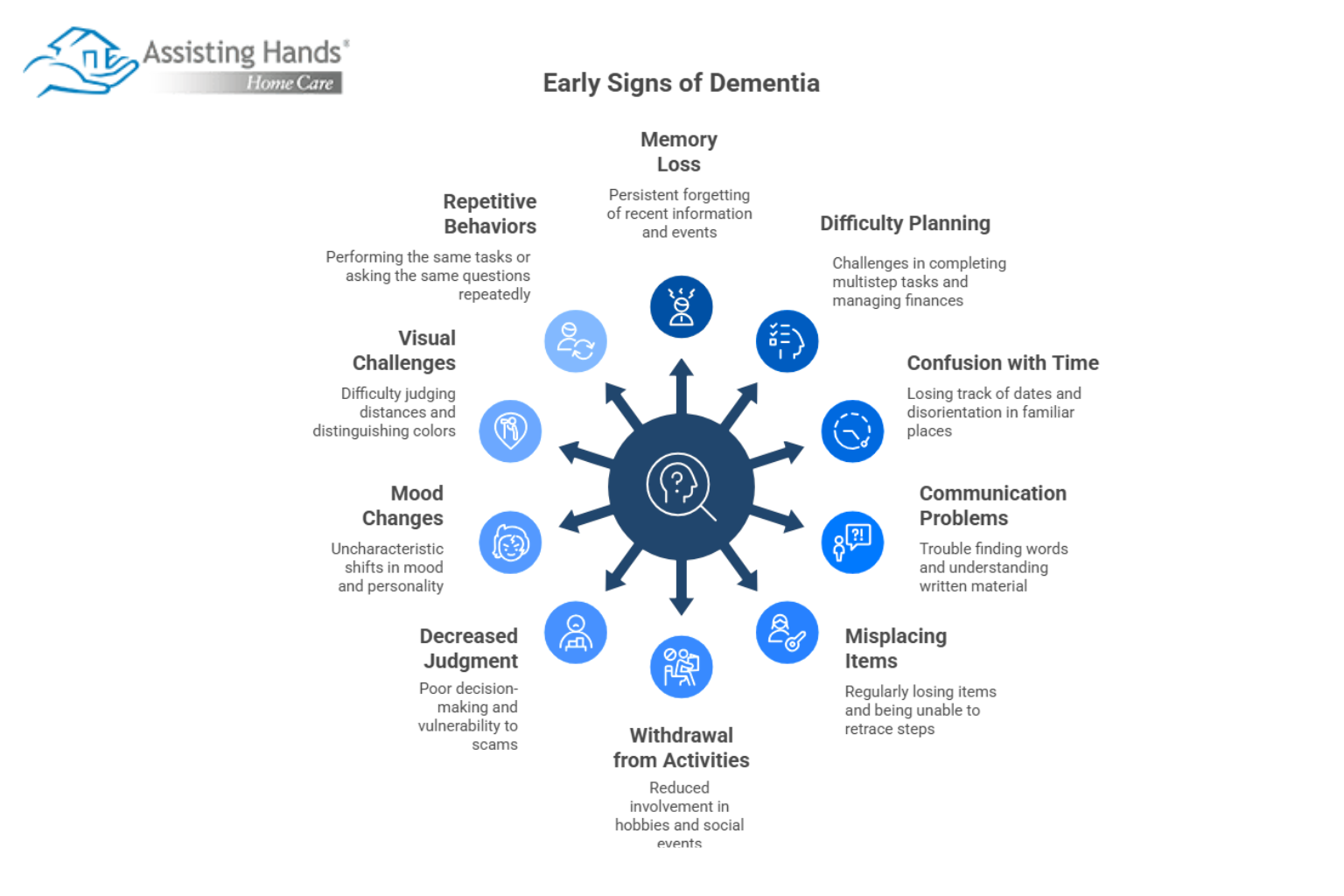
Table of Content
- 1 Memory Loss that Disrupts Daily Life
- 2 How to spot it
- 3 Difficulty Planning or Problem-Solving
- 4 How to spot it
- 5 Confusion with Time or Place
- 6 How to spot it
- 7 Problems with Words and Communication
- 8 How to spot it
- 9 Misplacing Items and Losing the Ability to Retrace Steps
- 10 How to spot it
- 11 Withdrawal from Work or Social Activities
- 12 How to spot it
- 13 Decreased Judgment or Decision-Making
- 14 How to spot it
- 15 Changes in Mood and Personality
- 16 How to spot it
- 17 Trouble Understanding Visual or Spatial Relationships
- 18 How to spot it
- 19 Repetitive Behaviors
- 20 How to spot it
Dementia is a condition that affects millions of people worldwide, and early detection can make a significant difference in managing symptoms and planning for the future. Understanding early signs is crucial for providing the right care and support to seniors experiencing cognitive changes. Below, we’ll explore 10 common early signs of dementia and how to recognize them.

Memory Loss that Disrupts Daily Life
One of the hallmark signs of early dementia is persistent memory loss that impacts everyday life. This isn’t the occasional misplaced set of keys or forgotten appointment. Instead, individuals may repeatedly forget recently learned information, ask the same questions multiple times, or have difficulty recalling important dates and events. If this becomes a pattern, it might signal the early stages of dementia.
How to spot it
- Difficulty recalling recent conversations or events
- Relying heavily on memory aids, such as notes or electronic reminders
- Forgetting the names of close friends or family members
Seniors can face a variety of challenges as they age, many of which can be mitigated with the help of professional in-home caregivers who provide high-quality senior care. Trust Assisting Hands Home Care to help your elderly loved one age in place safely and comfortably.
Difficulty Planning or Problem-Solving
People with early dementia may find it increasingly hard to follow tasks that involve planning, decision-making, or problem-solving. They may have difficulty balancing a checkbook, following a recipe, or managing bills and finances. This decline in cognitive skills can make once simple tasks seem overwhelming or impossible.
How to spot it
- Trouble completing multistep tasks, such as preparing a meal
- Difficulty concentrating or following a series of instructions
- Errors with basic calculations or day-to-day decision-making
Confusion with Time or Place
Losing track of dates, seasons, or the passage of time can be another early indicator of dementia. Individuals may also become disoriented, forgetting where they are or how they got there. This confusion often leads to anxiety and frustration as they grapple with their surroundings.
How to spot it
- Forgetting the day of the week or confusing time periods (e.g., past and present)
- Wandering into unfamiliar places or not understanding their location
- Becoming disoriented even in familiar settings
Problems with Words and Communication
Dementia can make verbal and written communication challenging. Individuals may forget common words, lose their train of thought mid-conversation, or repeat themselves frequently. Reading and writing may also become more difficult as time goes on.
How to spot it
- Pauses or challenges to find the right words during conversations
- Misusing words or using incorrect substitutes
- Trouble writing coherent sentences or understanding written material
Misplacing Items and Losing the Ability to Retrace Steps
Another common sign of early dementia is frequently losing items and being unable to retrace steps to find them. While we all occasionally misplace things, individuals with dementia may put items in unusual places and later lack the ability to remember where they left them or why.
How to spot it
- Regularly losing household items, such as keys or glasses
- Finding personal belongings in odd locations, such as a remote in the fridge
- Accusing others of theft due to inability to locate items
Withdrawal from Work or Social Activities
Early dementia can make individuals less inclined to engage in hobbies, social events, or work-related tasks. They may experience a loss of confidence in their abilities or feel overwhelmed by the cognitive effort such activities require.
How to spot it
- A noticeable decline in involvement with hobbies or interests
- Avoiding family gatherings, social events, or conversations
- Difficulty keeping up with work responsibilities or team projects
Decreased Judgment or Decision-Making
Poor judgment or decision-making often accompanies the early stages of dementia. Individuals may become more vulnerable to scams, make impulse purchases, or neglect personal hygiene. This can also extend to risky behaviors, such as forgetting to turn off appliances or leaving doors unlocked.
How to spot it
- Dressing inappropriately for the weather (e.g., wearing a jacket in the summer)
- Falling for telemarketing scams or phishing attempts
- Neglecting to pay bills or properly manage finances
Changes in Mood and Personality
Significant and uncharacteristic changes in mood or personality are another key early sign of dementia. For example, someone who was once outgoing and cheerful may become withdrawn, irritable, or easily upset. These changes often stem from confusion and frustration about cognitive difficulties.
How to spot it
- Increased irritability or feelings of paranoia
- Unusual shifts in confidence, such as sudden anxiety about familiar activities
- Depression or emotional flatness that seems inconsistent with their usual demeanor
Trouble Understanding Visual or Spatial Relationships
Some types of dementia, particularly Alzheimer’s disease, can affect visual and spatial abilities. This can make it hard to judge distances, distinguish colors, or understand spatial relationships, which can lead to accidents or challenges with driving, reading maps, or even navigating a room.
How to spot it
- Difficulty reading, interpreting charts, or following directions on a map
- Trouble judging distances, leading to accidents or frequent stumbles
- Challenges distinguishing colors and contrasts, particularly when driving
Families looking for top-rated Columbia elderly home care providers can reach out to Assisting Hands Home Care. From respite care to specialized Alzheimer’s, dementia, stroke, and Parkinson’s care, there are many ways we can make life easier for seniors and their loved ones.
Repetitive Behaviors
Repetitive actions or questions can be a sign of cognitive decline. Individuals with early dementia may find themselves performing the same task over and over, such as organizing items in the same way multiple times, or frequently asking questions they’ve already received answers for.
How to spot it
- Repeating the same question or story within a short period
- Continuously organizing or rearranging items without purpose
- Engaging in repetitive tasks, like folding and unfolding the same object
If your loved one has been diagnosed with dementia, a professional caregiver can be a wonderful resource for the whole family. Caring for seniors with dementia can be challenging for family caregivers. Luckily, there is dementia care Columbia families can rely on. Professional dementia caregivers help seniors with dementia stay safe and comfortable at home by preventing wandering, providing cognitive stimulation, and assisting with household chores. If your loved one needs professional care, Assisting Hands Home Care is here to help. Call one of our dedicated Care Managers today to learn about the high quality of our in-home care services.







